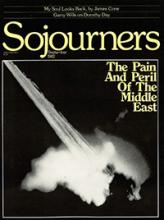I should begin by emphasizing that the two great wars of modern times had small beginnings. In our time, no local or regional conflict is as susceptible to internationalization as the one in the Middle East. Of the three most prominent crisis areas in the world today--Central America/South Africa, and the Middle East--this last one is the most likely to lead to the third world war, possibly involving nuclear weapons.
The reasons are numerous. First, conflicts in this area historically have involved the great powers of the time. The Middle East is a region that has never been easily defined as belonging in a single power's sphere of influence. In ancient times, the Roman, Byzantine, and Persian empires contested each other in the area. In modern times, the French, British, and Russians have been competing here. Today it has again become a primary area of superpower confrontation. This leads to the second point.
The centrality of the international struggle for power has shifted in the 1970s and the 1980s from the Atlantic and Pacific in the 1950s and 1960s to the area bounded by the Mediterranean and Indian Oceans. This puts Southern Africa and the Middle East in a central position, where the international struggle for power is heightened, its pace quickened, the risks and incidences of conflicts and proxy wars multiply, and the possibilities of the internationalization of. local or regional conflicts augment.
Read the Full Article

